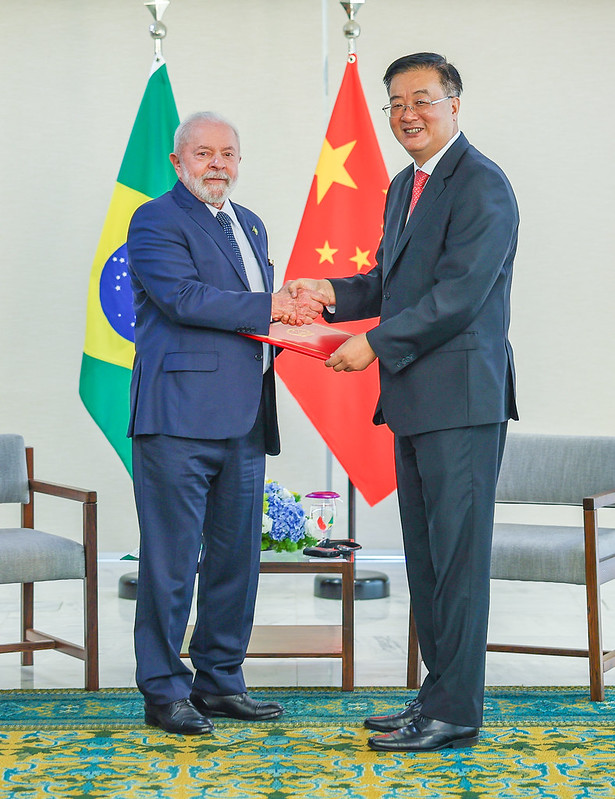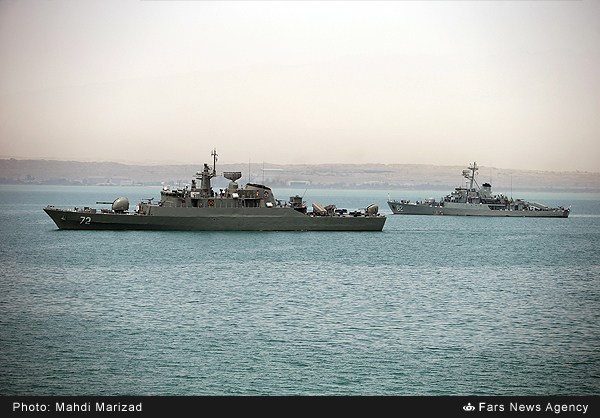“The People’s Liberation Army will take part in joint military exercises in Brazil, a rare step for the Chinese military in the western hemisphere.”
The participation of Chinese Marines in Operation Formosa, a multinational military exercise hosted by Brazil’s Navy, caps off a diplomatically busy summer between China and Brazil.[i] However, Chinese media coverage of the military exercise was muted. The excerpted article in the Hong Kong-based South China Morning Post reported on a single statement from the Chinese Defense Ministry, which noted the exercise would “deepen friendship and cooperation between the Chinese and participating militaries and enhance their ability to jointly respond to security risk challenges.” The SCMP article noted the focus of the exercise was joint landing and anti-landing combat drills—the same type of exercises the U.S. is engaging in across the nations of the South China Sea, to include the Philippines. The SCMP article did acknowledge that the Chinese military participation in Brazil was unusual given that Chinese military exercises are overwhelmingly focused on the South China Sea.
The exercise received different coverage in the Brazilian press. According to the excerpted article in Brazilian flagship news outlet Globo, the annual exercise featured 3,000 military personnel from Brazil, 63 U.S. Marines, and 32 People’s Liberation Army (PLA) Marines. Eight additional countries sent military observers.[ii] The U.S. had participated in the same exercise in previous years, but it was the first time for PLA personnel. While Brazil heralded the trilateral military exercise as significant for bringing the United States and China together, U.S. defense officials confirmed that U.S. troops participating in the exercise did not train nor participate alongside the contingent of PLA Marines participating in the exercise.[iii] No further explanations were publicized.
While minimal in scope, the participation of Chinese PLA Marines in Operation Formosa is but one of a host of other diplomatic collaborations between China and Brazil. This includes Brazil’s July pronouncement that it would like to participate in China’s Belt and Road Initiative; the joint commemoration of the 50-year anniversary of the establishment of diplomatic relations between China and Brazil in August; and Brazil and Chinese participation at the recent BRICS summit in St. Petersburg, Russia, in September.[iv] Seen in conjunction with these other events and pronouncements, the participation of Chinese Marines in Operation Formosa adds to the body of evidence of a deepening China-Brazil relationship.
Sources:
Yuanyue Dang,“In rare shift, China will send marine corps to Brazil for joint military exercise,” South China Morning Post, 6 September 2024. https://www.scmp.com/news/china/military/article/3277473/rare-shift-china-will-send-marine-corps-brazil-joint-military-exercise?module=perpetual_scroll_0&pgtype=article
The People’s Liberation Army will take part in joint military exercises in Brazil, a rare step for the Chinese military in the western hemisphere.
A detachment of the PLA Marine Corps will travel to take part in Exercise Formosa 2024 at the invitation of the Brazilian military, the Chinese defence ministry said on Thursday.
The exercises, with a focus on joint landing and anti-landing combat drills, would “deepen friendship and cooperation between the Chinese and participating militaries and enhance their ability to jointly respond to security risk challenges”, the ministry said in a statement on its website.
In recent years, China has hosted military medicine forums, senior military officer seminars and defence forums for Latin American countries, but it is not common for the Chinese military to travel to the region to take part in operations.
This year has seen an improvement in relations between China and Brazil.
Brazilian President Luiz Inacio Lula da Silva announced in July that his administration planned to join the Belt and Road Initiative, China’s flagship infrastructure and investment project.
Also in July, Chinese Defence Minister Dong Jun met visiting Brazilian army commander Tomás Ribeiro Paiva in Beijing.
Dong said during the meeting that the two militaries should “strengthen exchanges and learn from each other” to “jointly improve capabilities and take military relations to a new level”.
Source: Filipe Vidon, “Marinha une tropas dos EUA e China pela 1ª vez em operação militar no Brasil; veja fotos (Navy unites US and Chinese troops for the first time in a military operation in Brazil; see photos),” Globo, 11 September 2024. https://oglobo.globo.com/brasil/noticia/2024/09/11/marinha-une-tropas-dos-eua-e-china-pela-1a-vez-em-operacao-militar-no-brasil-veja-fotos.ghtml?fbclid=IwY2xjawFOo7tleHRuA2FlbQIxMAABHeVMuBtcSg4CrxXj-qkWNDCN23gW46nn_DjRQtSe3RH3p3C5Vzl6nPBQTg_aem_Q98CjbLroQQSbos97saIrg
63 US Marines and 32 Chinese Marines are participating in the exercise simultaneously.
The Brazilian Navy has achieved a feat: uniting US and Chinese troops on the same side of the “battle”. This is not a preparation for an imminent war, but rather Operation Formosa 2024, an annual military training operation that began on the 4th and will run until September 17, in Goiás.
“Foreign military personnel, together with Brazilian troops, conduct workshops to exchange experiences, known as Subject Matter Expert Exchange (SMEE). During this exchange, various military subjects are addressed, promoting greater integration between Brazil and friendly nations,” the Navy told Globo.
As columnist Ancelmo Gois anticipated, the rivalry between the two countries is not only international, but also 63 US Marines and 32 Chinese Marines are participating in the exercise simultaneously. The Armed Forces will act together, simulating an amphibious operation, considered the most complex of military operations. All weapons used will use live ammunition. The training also aims to promote integration between the Brazilian Navy, Army and Air Force. The objective of the exercise is to prepare Brazilian military personnel to act together in live-fire activities, in controlling airspace and in executing the maneuver during the so-called “Operation of Replacement by Overtaking”. In this phase of the training, responsibilities are transferred between the Armed Forces, which take turns in controlling the actions to achieve the proposed mission. Armored vehicles from the Marine Corps (CFN), such as the JLTV, the ASTROS system, the Piranha, the Amphibious Tracked Car (CLAnf), the UNIMOG truck, in addition to the AF-1 Skyhawk fighter and Navy helicopters. The FAB’s KC-390 Millenium, A-29 Super Tucano and R-99 aircraft, as well as the Army’s ASTROS, Guarani and M60 Combat Car, will also be on display in the operation.
“The holding of major military exercises, such as the Specific Joint Training for Combined Weapons Employment, is essential for optimizing the operations of the Brazilian Armed Forces, promoting efficient integration between the Navy, Army and Air Force. These exercises are designed to improve the coordination and execution of joint operations, addressing crucial aspects such as: fire support, airspace control, command and control, maneuver and logistics,” says the Navy.
Notes:
[i] Operation Formosa has nothing to do with the island of Formosa, otherwise known as Taiwan. Brazil named the annual operation “Formosa” in the 1990s, reflecting its proximity to the Brazilian city of Formosa in the state of Goiás, near the capitol of Brasilia.
[ii] Eight countries sent military observers to Operation Formosa 2024; Argentina, France, Italy, Pakistan, South Africa, Congo, Mexico and Nigeria. See: “Marinha une tropas dos EUA e China pela 1ª vez em operação militar no Brasil (Navy joins US and Chinese troops for the first time in military operation in Brazil),” Globo (mainstream Brazilian news service), 11 September 2024. https://oglobo.globo.com/brasil/noticia/2024/09/11/marinha-une-tropas-dos-eua-e-china-pela-1a-vez-em-operacao-militar-no-brasil-veja-fotos.ghtml
[iii] For additional information on the U.S. position regarding Chinese PLA Marines participating in Operation Formosa, and statement by Pentagon official noting that “U.S. Marines were only at Formosa to train with their Brazilian partners,” see: “Chinese troops to join Brazil’s military drills with US forces,” Reuters, 10 September 2024. https://www.reuters.com/world/china-joins-brazilian-military-exercises-alongside-us-troops-2024-09-10/?utm_source=sailthru&utm_medium=email&utm_campaign=mil-ebb
[iv] For reporting on the meeting commemorating 50 years of diplomatic relations between China and Brazil, see: “Chinese vice president attends reception for 50th anniversary of China-Brazil diplomatic ties,” XinhuaNet (English language Chinese Media), 14 September 2024. https://english.news.cn/20240914/2a6daa8898ef41d29115085d83858256/c.html; for additional reading on the recent Meeting of BRICS High-Ranking Officials Responsible For Security Matters/National Security Advisors in St Petersburg Russia, see: “China welcomes more Global South partners to join BRICS—senior Chinese official,” XinhuaNet, 12 September 2024. https://english.news.cn/20240912/4f0d08a4cd98443694fa4fc8a4ddfcf0/c.html


